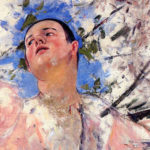We run our website the way we wished the whole internet worked: we provide high quality original content with no ads. We are funded solely by your direct support. Please consider supporting this project.

The Holy Spirit Behind the Scenes
In John 17 we read Jesus’ prayer to be one with each another in Christ. Jesus prayed that his disciples
… may be one. As you, Father are in me and I am in you, may they also be in us. … I in them and you in me, that they may become completely one, so that the world may know that you have sent me and have loved them even as you have loved me. … I made your name known to them, and I will make it known, so that the love with which you have loved me may be in them, and I in them. (John 17:21, 23, 26)
Our union with the Father reflects and participates in the union of the Father, Son, and Spirit. The same glory that the Father ascribes to the Son is now given to all who are in the Son, which is to say, we participate in the glory of God. However, this passage only mentions the Father and Son, leaving out the Holy Spirit. Why is this the case?
I argue that the Holy Spirit is very much included in our participation in the Father and Son’s love for one another, but he is so as a “silent partner.” The particular way that the Spirit lovingly and submissively participates in our dance with the triune God is by working behind the scenes, as it were, to make it all happen. The Spirit is not the explicit object of the dance but the one working on the inside to open the dance up for us to participate.
Here are some of the ways that the Spirit does this. The Holy Spirit:
- works in our hearts to open us up to trust in Christ Jesus (John 3:5; 1 Cor 12:3).
- reconciles us to the Father through Christ (Eph 2:18).
- abides in us (1 John 3:24).
- teaches us (John 14:26; 16:13).
- transforms us (2 Cor 3:17-18).
- empowers us (Acts 1:8; Rom 8:13).
- leads us (Rom 8:14; Gal 5:18).
- sets us free from the law (Rom 7:6; 8:2-4).
- mediates the abundant life of the Trinity to us (John 7:38-39; Rom 8:14; 16; 26-27).
The Holy Spirit causes the love the Father has for us to abide within us and flow through us (Rom 5:5; Col 1:8). Thus the unity of the church—our being one as the Father and the Spirit are one—is the unity in the Holy Spirit.
Our participation in the love of the Father for the Son and the love of the Son for the Father is a participation in the Holy Spirit, for the Holy Spirit is the Spirit of both the Father and the Son (Rom 8:9-11). The Holy Spirit works and abides within us, pointing us to Christ, placing us in Christ, all the while causing us to participate in and be transformed by the love the Father has for the Son and the love the Son has for the Father.
Adapted from Repenting of Religion, pages 39-41
Photo credit: Sint-Katelijne-Waver on Visual Hunt / CC BY-NC-ND
Category: General
Tags: Love, The Holy Spirit, Trinity
Related Reading

Does the Holy Spirit Still Do New Things? (podcast)
Greg explores the nature of God’s revelation, as it pertains to scripture and the Holy Spirit. Episode 636 http://traffic.libsyn.com/askgregboyd/Episode_0636.mp3

The Cleansing of the Temple and Non-Violence
Jesus’ cleansing of the Temple is the most commonly cited example of those who allege that he did not absolutize loving enemies or refraining from violence. I submit that this episode implies nothing of the sort. First, it is important that we understand that this episode was not an expression of unpremeditated anger on Jesus’…

God’s Aikido Way of Defeating Evil
Greg continues his thoughts on the atonement with this installment highlighting the way God uses the evil intentions and actions of his enemies to bring about good. And because this strategy is based in love, the demons who encountered Christ could not possibly imagine what he was up to. They ended up participating in their…

The Image of Cross-Like Love: God’s Self-Portrait, Part 6
In the previous blog I argued that God is cross-like love. In this blog I’d like to take this a step further by demonstrating why the cross alone could function as the definitive revelation of God’s true character and by showing how this revelation weaves together everything Jesus was about. If you want to know…

How to Produce the Fruit of the Spirit
When the New Testament tells us to be loving, joyful, peaceful, kind and so on, it is not giving us a new set of behaviors that we are to strive to accomplish. Striving to attain them means nothing if they are sought as ethical ideals or to meet a set of religious rules. They have…

What Power Do You Trust?
Governments and nations have always relied on fighting to survive. They punish criminals who threaten their welfare. They go to war against enemies who attack their borders or stand in the way of their agenda. This is how the kingdoms of the world maintain law and order and advance their causes. By contrast, the Kingdom…
